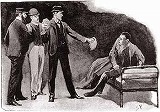“Let me introduce you,” he shouted, “to Mr. Neville St. Clair, of Lee, in the county of Kent.”
Never in my life have I seen such a sight. The man’s face peeled off under the sponge like the bark from a tree. Gone was the coarse brown tint! Gone, too, was the horrid scar which had seamed it across, and the twisted lip which had given the repulsive sneer to the face! A twitch brought away the tangled red hair, and there, sitting up in his bed, was a pale, sad-faced, refined-looking man, black-haired and smooth-skinned, rubbing his eyes and staring about him with sleepy bewilderment. Then suddenly realizing the exposure, he broke into a scream and threw himself down with his face to the pillow.

“Great heavens!” cried the inspector, “it is, indeed, the missing man. I know him from the photograph.”
The prisoner turned with the reckless air of a man who abandons himself to his destiny. “Be it so,” said he. “And pray, what am I charged with?”
“With making away with Mr. Neville St. - - Oh, come, you can’t be charged with that unless they make a case of attempted suicide of it,” said the inspector with a grin. “Well, I have been twenty-seven years in the force, but this really takes the cake.”
“If I am Mr. Neville St. Clair, then it is obvious that no crime has been committed, and that, そして therefore, I am illegally detained.”
“No crime, but a very great error has been committed,” said Holmes. “You would have done better to have trusted your wife.”
“It was not the wife; it was the children,” groaned the prisoner. “God help me, I would not have them ashamed of their father. My God! What an exposure! What can I do?”
Sherlock Holmes sat down beside him on the couch and patted him kindly on the shoulder.
“If you leave it to a court of law to clear the matter up,” said he, “of course you can hardly avoid publicity. On the other hand, if you convince the police authorities that there is no possible case against you, I do not know that there is any reason that the details should find their way into the papers. Inspector Bradstreet would, I am sure, make notes upon anything which you might tell us and submit it to the proper authorities. The case would then never go into court at all.”
“God bless you!” cried the prisoner passionately. “I would have endured imprisonment, ay, even execution, rather than have left my miserable secret as a family blot to my children.
“You are the first who have ever heard my story. My father was a school-master in Chesterfield, where I received an excellent education. I travelled in my youth, took to the stage, and finally became a reporter on an evening paper in London. One day my editor wished to have a series of articles upon begging in the metropolis, and I volunteered to supply them. There was the point from which all my adventures started. It was only by trying begging as an amateur that I could get the facts upon which to base my articles. When an actor I had, of course, learned all the secrets of making up, and had been famous in the green-room for my skill. I took advantage now of my attainments. I painted my face, and to make myself as pitiable as possible I made a good scar and fixed one side of my lip in a twist by the aid of a small slip of flesh-coloured plaster. Then with a red head of hair, and an appropriate dress, I took my station in the business part of the city, ostensibly as a match-seller but really as a beggar. For seven hours I plied my trade, and when I returned home in the evening I found to my surprise that I had received no less than 26s. 4d.